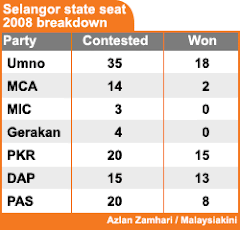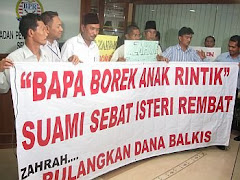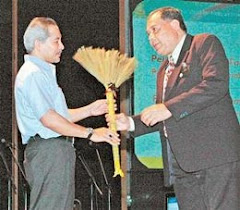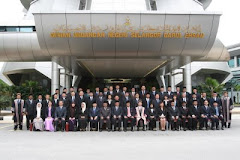April 23, 2008 By LOONG MENG YEE,
VETERAN Sungai Pinang state assemblyman Teng Chang Khim, once branded a nuisance and suspended from the Selangor state assembly for 30 months, makes a historic return to the august House as its first non-Malay Speaker.
With Teng, a lawyer, at the helm, the House is set to be a more exciting and lively political forum, instead of just a rubber stamp.
Following is an exclusive interview StarMetro has with the four-term state assemblyman:
StarMetro: Many consider you the most appropriate candidate for the position. You are trained to respect the law and you know the state assembly Standing Order like the back of your hand.
Teng: I will discharge my duty to the best of my ability, and be a pro-active Speaker instead of just a figurehead. This House represents an important institution where state legislations are debated and passed.
The elected representatives have a heavy responsibility as they carry the voice of their voters. I thank the state government for the confidence in me to manage the House.
StarMetro: When you were the state opposition leader, almost all your motions were thrown out within the first few minutes of the sittings. Last year, you were shut out from the House for 30 months, causing you to lose about RM120,000 in allowances.
Teng: Because we have been in opposition before, we know how the Barisan Nasional ruling party wants to curtail the power of the opposition. This is wrong. It needs to be revamped.
Whatever I do will be based on the Standing Order. In the House, there is no ruling party or opposition. All are elected representatives and they carry with them the aspirations from their constituencies.
As the Speaker, I must be fair and neutral. No one should be silenced because of personal vendetta. I will not treat the Barisan Nasional representatives the same way they had treated me. Let bygones be bygones.
The House is like a glasshouse. Many eyes are watching. Whatever I do, I will be answerable to my voters in five years' time.
StarMetro: No politics of revenge? You will not be harsher on the elected representatives from the Barisan Nasional, and be more accomodating to those from the Pakatan Rakyat?
Teng: There is a saying that whether a cat is black or is white, as long as it catches rats, it is a good cat.
Let me offer my version of the saying; I don't care whether it is a white rat or a black rat, as long as it is a rat, I will catch it.
StarMetro: With your vast experience as DAP's most senior state assemblyman in Selangor, having been the elected representative for four terms, many people and groups had publicly called for you to be made the deputy mentri besar or at least a state executive councillor. The DAP does not seem to agree because some of your own party colleagues claim you are not a team player.
Teng: Correction, I am a team player. I am just not a gang player, where the agenda is to achieve the goals of a small group of people. My decision to accept the Speaker’s post, and not lobby for an executive councillor post, is proof that I practise what I preach.
StarMetro: You were making a very comfortable income as a lawyer. The salary and allowances as a Speaker and state assemblyman total about RM16,000 a month. Does it match what you were making?
Teng: Yes, the income has reduced. But I am standing at a threshold of challenge and change. In life, there are times you decide to walk the road less taken because you are convinced that what you contribute can make a difference.
StarMetro: Some people view the state assembly as nothing but a rubber stamp for the ruling government, that your Speaker position is largely ceremonial.
Teng: Yes, many do hold that assumption, even for Parliament. It is because the opposition has been relatively weak and the Barisan Nasional government has been high-handed since 1969. Pre-1969 circa, the prime minister, for instance, would come personally to answer the questions every Wednesday or Thursday. Then, Parliament was suspended from 1969 to 1971, after the May 13 incident. (During the period, the country was placed under the rule of a National Operation Council.)
The first election after May 13 was held in 1974. From then, the Barisan Nasional government got too powerful until it controlled more than two-thirds of the seats.
It used the majority to push hard for the New Economic Policy. This happened in the state governments ruled by the Barisan Nasional. The state assemblies were criticised as being rubber stamps. The winds of change ushered in a new political era for the country following the March 8 general election this year.
The people are watching closely, to see if the alternative coalition could also bring changes into the Parliament and state assemblies, especially in Kedah, Penang, Perak, Selangor and Kelantan.
StarMetro: What kind of assembly can we expect with you as the Speaker?
Teng: That the House should return faithfully to its role as a dynamic institution where bills are extensively debated before they are passed.
Not merely rushing through the debates just because the assemblymen want to call it a day after lunch. Also, for the question and answer time, it can be extended to one-and-a-half hours instead of the one-hour session now. We must provide more time for the elected representatives to ask questions. Give me about a year to make the changes and implement the proposals.
StarMetro: What ideas do you have?
Teng: For example, we can refer to the US House of Representatives, the English Parliament and the Indian Parliament, where they have committees comprising representatives from both sides of the political divide to look into different areas of public interests, such as agriculture, labour, education, etc.
Of course, these are more for the Parliament level, but we can have similar versions of such watchdog committees at the state assembly.
Under our present standing order, the state assembly has several select committees, such as one to oversee public accounts and the privilege committee. Beyond that, there is also provision for select committees on ad hoc basis to look into specific issues of alleged abuse or malpractices by the state government.
For this kind of select committees, the House can seek the input of professionals, non-governmental organisations or other experts, for more in-depth information and diversified views.
StarMetro: After the various committees have finished their inquiries and submitted their reports, does the House have the power to punish those found responsible?
Teng: No, the House does not have any punitive powers. We can only forward the studies or inquiry results to the state government for action. The committees can make recommendations for appropriate actions, though.
StarMetro: Does the Speaker have power to initiate inquiries on his or her own?
Teng: No, the Speaker cannot act on his or her own. The House can suggest the need for such committees and even nominate the panel members. But we will need the full support from the state government.
StarMetro: Will the Pakatan Rakyat state government be supportive of such a dynamic House?
Teng: I believe the state government will want to have a dynamic legislature to assist it to design proper policies for the people, and to involve greater public participation.
After all, we are talking about implementing a new order – where the people are the boss.
Subscribe to:
Post Comments (Atom)










No comments:
Post a Comment